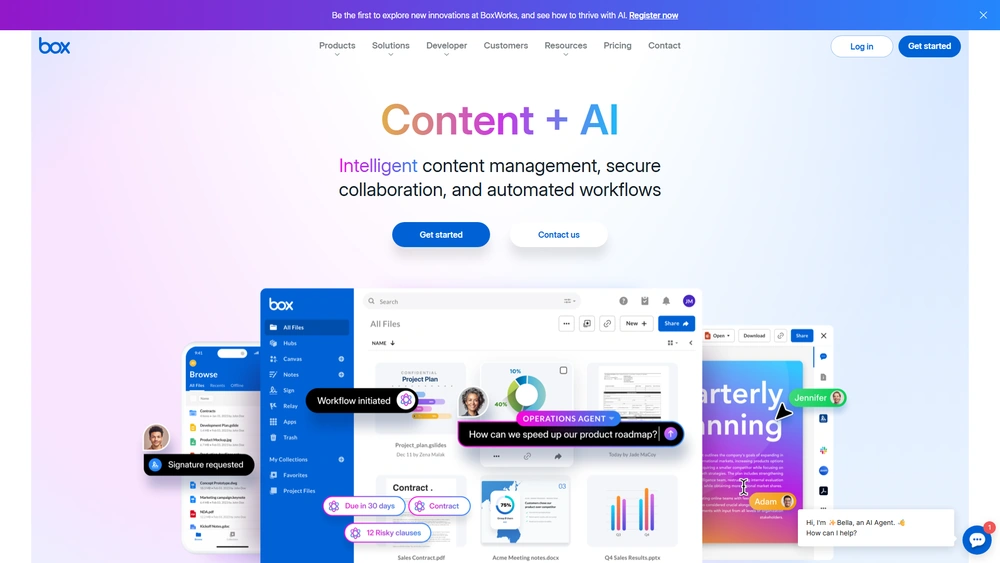Box Overview & 2026 Industry Position
Box is a cloud-based content management and collaboration platform designed for enterprises that require secure data handling, seamless collaboration, and regulatory compliance. Founded in 2005, Box quickly gained traction among organizations seeking scalable document sharing solutions. In 2026, Box positions itself as a leader in unified content governance, automation-powered workflows, and AI-enhanced data handling—putting it at the forefront of regulated industry adoption (healthcare, finance, government).
Box offers both power and simplicity: secure file storage, document sharing, e-signature integration, and content lifecycle management, all accessible in one platform. Its 2025 lineup emphasizes trust-centric architecture, enterprise-grade security, and tighter integrations across productivity ecosystems.
From Launch to 2026: Box’s Journey
Box began in 2005 as a simple file-sharing service founded by Aaron Levie and Dylan Smith. Initially targeting consumer users, Box pivoted toward enterprise clients by 2010, focusing on robust security and compliance. Major milestones include:
- 2011: Introduced enterprise admin controls, marking its B2B pivot.
- 2015: Public IPO under the NYSE ticker BOX.
- 2018: Launch of Box Skills — early AI-powered content intelligence.
- 2021: Box Sign introduced for integrated e-signature workflows.
- 2023: Smart Content Insights debut using native machine learning.
- 2024: Content Cloud expanded to include deep GPT model partnerships.
2026 Strategy: Box aims to become the AI-governance engine securing the future of enterprise collaboration—enabling smarter decisions without sacrificing compliance or control.

Box Key Features
Box’s ecosystem blends powerful content collaboration with deep integrations and built-in security. Key 2025 features include:
- Box Drive: Desktop app to access Box files as if they’re on your local system.
- Box Notes: Real-time collaborative notetaking across teams.
- Box Sign: Native e-signature workflows with audit trails and verification.
- Box Relay: Visual workflow automation with no-code triggers.
- Box Shield: AI-powered threat detection and classification for sensitive data.
- Box AI: GPT-supported native intelligence for document summarization, categorization, and Q&A inside content.
Workflow & UX Experience
Box offers a clean, modern interface with minimal learning friction. Two key UX strengths stand out in 2026:
- Unified Navigation: Quick access to all apps (Drive, Sign, Relay, Shield) from a central console.
- Context-Based Actions: Users can preview, sign, comment, and send documents from any view without leaving the page.
- Custom Workflows: Relay allows admins to automate frequent approval pipelines or access requests with drag-and-drop interfaces.
- Accessibility: WCAG 2.1 AA compliance and keyboard-friendly workflows for accessibility at scale.
Box Pricing Analysis & Value Metrics
As of July 2026, Box offers four primary pricing tiers, with annual billing discounts and custom enterprise pricing.
| Plan | Price/User | Key Inclusions |
|---|---|---|
| Business | $20/month | 100GB storage, Box Notes, Shield Basic, Relay |
| Business Plus | $33/month | Unlimited storage, advanced search, Box Sign |
| Enterprise | $47/month | Full Shield + Relay, custom retention, integrations |
| Enterprise Plus | Custom | AI toolkit, Smart Content Insights, 24/7 Support |
Value Verdict: Box remains competitively priced, especially for firms needing audit-ready compliance tools and embedded e-signing.
Pro Tip: For highly regulated firms, upgrading to Enterprise gets you Box Shield and Relay—crucial for data residency and compliance workflows.
Competitive Landscape
| Platform | Key Strength | Not Ideal For |
|---|---|---|
| Box | Compliance, security, UX | Price-sensitive SMBs |
| Dropbox Business | Sleek UI, file sync | Advanced compliance |
| Microsoft 365 | Native Office integrations | Non-Windows shops |
| Google Workspace | Ease of sharing and collab | Granular governance |
Box Use Cases
Box serves industries where document intelligence, permissioning, and full-traceability matter most:
- Legal: Contract lifecycle workflows and litigation holds
- Healthcare: HIPAA templates and secure patient file exchange
- Finance: SOC 2-ready archiving and investor report access
- Construction: Large file sharing and secured approvals
- Education: Instructor content libraries and remote onboarding
Box Integrations
Box offers over 1,500 integrations across productivity, CRM, HR, ERP, and vertical stacks. Highlights include:
- Slack & Teams: Collaborate and comment directly in-channel
- Salesforce: Embed Box in record views, automate file sharing
- DocuSign, Adobe Sign: Supplement or pair with Box Sign
- Okta, Azure AD: Modern SSO and access control
- Power Automate & Zapier: Extend Box Relay triggers
Pros & Cons
- Pros:
- Best-in-class compliance and governance tools
- Clean UI and intuitive workflows
- Trusted by regulated sectors
- Integrated e-signature + AI search
- Massive connector ecosystem
- Cons:
- Higher entry cost than generic cloud storage
- Complex configuration for finetuned policies
- Limited offline functionality
Final Thoughts
Box continues to raise the bar for intelligent, secure, enterprise-scale content collaboration in 2026. It excels when compliance and content velocity must coexist—making it a high-value pick for finance, healthcare, and global enterprises that prioritize control. While costs may outmatch cheaper storage-first options, the governance and intelligence layer delivers long-term ROI.
Box FAQ
Yes, Box is HIPAA compliant and offers Business Associate Agreements (BAA) for qualifying clients.
Absolutely. Box integrates with Microsoft Teams, Word, PowerPoint, and Outlook for seamless workflow enhancement.
Box holds certifications including SOC 1, SOC 2, ISO 27001/27018, FedRAMP, and GDPR compliance among others.
Box AI empowers users to ask questions about content, generate summaries, and automate classification—all inside the platform using embedded GPT models.
Yes, Box offers robust iOS and Android apps for file access, signature, sharing, and offline document interactions.

